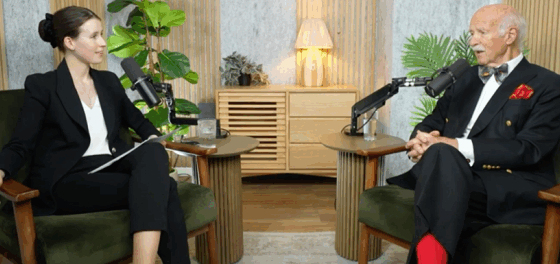So much content I encounter is meaningless AI slop. I share some rules I use. How Airbnb being legislated out. We have more time, but we don’t want to wait. And many more stories.
Hello,
It’s back-to-school time again, we were all super happy to spend time with the kids. But we’re also quite happy to see them go to school again. I had deep discussions about what they learn in school, but that will be for another day. Enjoy the newsletter!
Best, Martin
Sponsored by Klairhaus. Support the newsletter, treat someone to great office gadgets.
Who controls bookings in the AI era?
Interesting overview of hotel bookings in the AI era by someone who has been innovating in the business for a few decades. There are some serious ideas here that need to be taken into account including what to do to grow direct bookings in the agents world. While this isn’t the biggest distribution problem today as most of the revenue is happening elsewhere, the internet wasn’t a big problem in 1999…
HOTEL BOOKINGS AI ERA
Airbnb wars
Governments are fighting to stop Airbnb and short term rentals. Side note, this is a unfortunate side-effect of really good branding, the brand = the industry. The official reason is often a noble goal to increase the housing market. I’d love to see the numbers on the success of this strategy. However on the other hand I’ve seen beautiful city centers in Italy with a half-dozen key boxes, indicating that this does carve out locals from living there. But would they be able to afford it if it was empty?
PROPERTY LEGISLATION CHALLENGES
About me: I'm a fractional CMO for large travel technology companies helping turn them into industry leaders. I'm also the co-founder of 10minutes.news a hotel news media that is unsensational, factual and keeps hoteliers updated on the industry. Tech and AI are making time valuable
There’s a funny paradox in the world. As tech and AI gives us more time, we value time more and feel like we have less of it. In the past it was normal to wait in line for some minutes, now we have zero tolerance for wait. And yet we technically have more time to wait since tech and AI does more work for us. It’s called Jevons paradox, and can explain why the electricity bill keeps going up, despite changing all the light bulbs to LED. For the hotel industry it means delivering better service, faster and also cheaper.
AI IMPACT ON BRANDS
Like this? Share it!
Hotels building tech
In an absolute concept, hotel brands are “technology” companies. They provide the know-how to make a hotel experience scalable. In theory it would be logical that they also provide a tech stack and build their own. But practice has repeatedly shown that this doesn’t work. Some thoughts from the founder of a hotel tech company. Maybe we should ask the CEO of Accor or some other global chain to explain why it just doesn’t work.
HOSPITALITY TECH CHALLENGES
The economics of tourism
A big part of the world depends on tourism. According to this report about 10% of global tax revenue comes from tourism. And it keeps growing. So how do we best plan for the future so locals, environment and tourism can live together? The report doesn’t lay out the answers, but gives some action items.
DESTINATION OVERCROWDING
AI tools for marketing team
Former VP Marketing of Hubspot shares his AI marketing tool stack. There are some really great tips in there. I’m not certain all the elements work as good as the post claims so I’d take some of these with a grain of salt – but it is always interesting to get ideas from people who know their industry. Even though sometimes it feels like some kind of influencer play.
AI MARKETING TOOLS
Google’s Magic Cue native AI Assistance
We’re still figuring out how to send an invoice by email in hotel tech. But while that is being resolved – Google’s new OS level AI integration is blurring the lines between our applications and systems. Bringing AI into a very practical level, such as “get me the phone number to the hotel I’m staying at tonight”. Little improvement that will help make travel (and daily life) that much easier. These little improvements bring what used to be luxury services to daily life with tech. I think hotels should realize how much service people are used to receiving every day.
OPENAI ADVERTISING PLATFORM
Podcast: I was invited to talk about AI in hospitality on this podcast, along with many other great industry thought leaders. A great discussion, we didn't agree on everything. Which made it more interesting. Opinion
4 tips to using AI and not creating slop
We’re starting to drown in AI slop: LinkedIn posts and articles that are entirely AI-conceived (and possibly executed). They look like content, but they’re really just a collection of bland, recycled statements with no insights and no opinions. When I finish reading I realize I’ve learned… nothing, to be precise, agreeable nothing.
And it’s not just in posts, it’s creeping into the comments too. On my post about travel distribution (overtourism), there were several comments where I could almost see the boring prompt behind it, something like “Please suggest a comment.” The result? 5-6 lines of text, nodding along, and encouraging me to continue. Very meh, I even struggled to reply to them as there was just zero meaning. I like the encouragement, but please try to bring an opinion, so much more fun.
The problem isn’t AI itself. It’s how some people are using it. Too many are outsourcing the actual thinking to the machine. That’s where you get these non-ideas: “Top five hotel tech trends” or “The importance of customer experience.” AI can generate lists like these forever, but they’re devoid of much thoughtful meaning, because they’re generated based on the average of what is out there – hence utterly meaningless lists. And yet, having an opinion and meaning is kind of what we humans like about reading each other.
So, to help avoid that, here are some rules I stick to:
-
The idea must be mine. AI is great for inspiration, but if it’s inventing my concept, it will be boring. I don’t let it invent.
-
Use AI as an editor, not an author. It can structure my text, polish my style, or improve clarity. But if I wouldn’t say it like that myself, I won’t let an AI say it for me.
-
Bring my own data. GenAI makes things up, that’s literally how it works. I bring my own data, 8 minutes of unstructured thoughts, 300 words of text, numbers, facts etc.
-
Posting is communicating. Every article or post is me conveying a concept to someone else (at least that’s the idea). If I hand this over to a bot, I’m not communicating, I’m just spamming.
The irony is that AI can make us better communicators when used well. It can help untangle thoughts and make messages sharper. But when it replaces the thought itself, you get what we’re seeing sometimes on LinkedIn and in posts: a soup of agreeable nothingness.
So don’t be in the “vanilla posts” wave. Share an opinion, argue a point, or highlight a detail that stood out to you. Even if you agree, say why. That’s what makes it human, and that’s what makes it worth reading.
Oh and tell others. We’ll all be better off IMO.
• The evolution of fans and fandom from Taylor Swift to sports – Link
• Are Media Apps the Future of Reader Engagement? – Link
• Influence Society Design & Tech Benchmark Q3 2025 – Link⁺
⁺ Note, articles that are published by companies or people I work with are tagged with the ⁺ symbol or Partner word. I’m adding this as a transparency. Previously I avoiding sharing content from partners to remain objective, but sometimes they have excellent articles that deserves being shared so to remain transparent, I’ll tag them.
Start writing today. Use the button below to create your Substack and connect your publication with Tell • Martin Soler’s Newsletter






